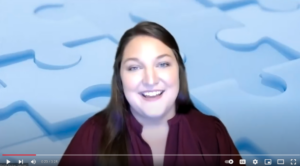
Mariah Parker participated in Berkeley Lab’s 2020 SLAM competition
Research News periodically features a former Lab postdoc who has continued their career in academia, government, industry, or another sector. In this issue, we catch up with Mariah Parker, who was a postdoc at Berkeley Lab from 2019 to 2022, and who is now a senior research and development chemist at Afton Chemical in Richmond, Virginia.
What have you been working on since you left the Lab?
I’ve been at Afton Chemical for a year and a half. Afton is a lubricant additive company that works primarily in the automotive industry; our products make things move smoothly. My team and I are working on the next generation of engine oils that are cleaner, better, and longer lasting. We are also looking for ways to make engines and engine oils more sustainable; for example, engines in hybrid vehicles have different lubricant requirements than vehicles that only have an internal combustion engine.
What did you work on as a postdoc at the Lab?
I worked in the John Gibson’s actinides chemistry lab on gas-based chemistry. Actinides are the 14 metallic elements at the bottom of the periodic table, all of which are radioactive. We looked at the fundamental mechanisms and interactions of these elements using gas-phase chemistry techniques (think what happens when molecule A collides with molecule B and why). This understanding can lead to wonderful potential applications for actinides, for example, breaking up carbon dioxide or cancer treatment.
What was your experience like?
At first it was intimidating because the Lab is so prestigious, but I realized quickly that there are so many wonderful people there. Everyone was open, collaborative, and so supportive of postdocs. The resources were phenomenal, the research was really cool, and I met so many different people doing so many different types of wonderful science. I even met a woman who went to Antarctica to collect samples; it was great to learn about her experiences.
What resources did you take advantage of?
I took advantage of a lot of training that the Lab offered, including the Career Pathways Office’s career days, seminars, and presentations by outside speakers on how to interview, give talks, and translate research to non-scientists. The Early Career Employee Resource Group (ERG), which I chaired for a time, offered networking events and lunch-and-learns. I also went to the Berkeley Lab Postdoc Association (BLPA)’s networking events.
My grandfather’s motto was, “You get what you give,” and I really took that to heart. Especially when you are at a new job or new place, if you reach out, and look for connections and experiences, you’ll get it all back.
How did you decide on your career path and to what extent did Berkeley Lab support you in your career path?
Berkeley Lab changed my perspective. My grad school preached academia as the best career path for Ph.D. candidates, and I accepted that without questioning it. I loved teaching and I’m extroverted, so it felt like a fit for me. But at Berkeley Lab, the postdocs were encouraged to be open to many other opportunities. We explored the pros and cons of being in academia, as well as working at national labs, in government, or in industry. I learned that I could do lots of good things in industry. This exposure really shifted my perspective about my career options. I started going to seminars with industry speakers, having one-on-one meetings with companies in Emeryville to learn more about industry career paths. A friend of mine was working at Afton, which is how I learned about this opportunity.
What is it like working in industry?
In academia, oftentimes you’re an expert in a niche area. In industry, you are expected to be an expert in a broader range of areas. You are engaged in more diverse projects and techniques. You are also engaged not just in the science but in the business implications of your work, the resource demands. Every day is different. And the funding environment is not the same; you still have to present and to argue for funding, but often it’s not a make-or-break situation. And, frankly, many industry positions pay more.
Do you have any tips for current postdocs?
Take advantage of the training opportunities at the Lab, particularly in the areas where you know you need help. These include the training sessions I mentioned earlier but also things like LinkedIn Learning courses. These resources are free at the Lab to staff; they may not be available when you leave. I took Python and R programming courses. There are so many courses available, all at no cost to you. I also participated in the SLAM competition. The skills I learned through that experience are skills I use all the time. Having a three-minute, layperson, elevator pitch about your work is so valuable. I have one for my current job.
I also encourage postdocs to say yes to opportunities outside the research that you are doing. Get involved in the BLPA, or the Early Career ERG. These are safe places to get leadership experience – how to lead meetings, delegate, manage projects, mentor others. These experiences will be invaluable for your next roles, wherever you end up.
And, I’d also remind postdocs that it’s ok to change your mind. You may have a life plan, but your experiences may lead you elsewhere. It can be scary to go off your planned path, but it’s ok. It can be a fun adventure.

